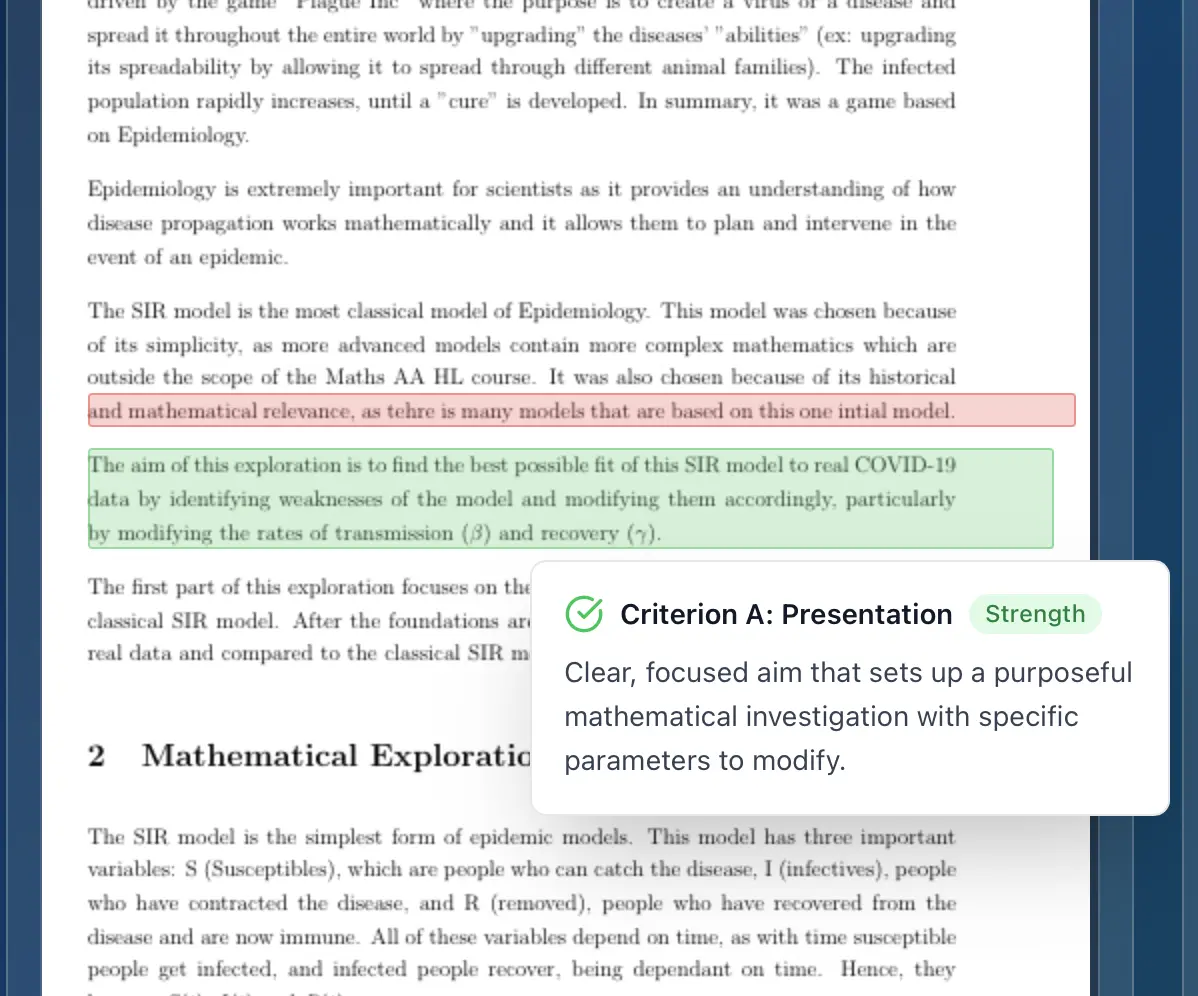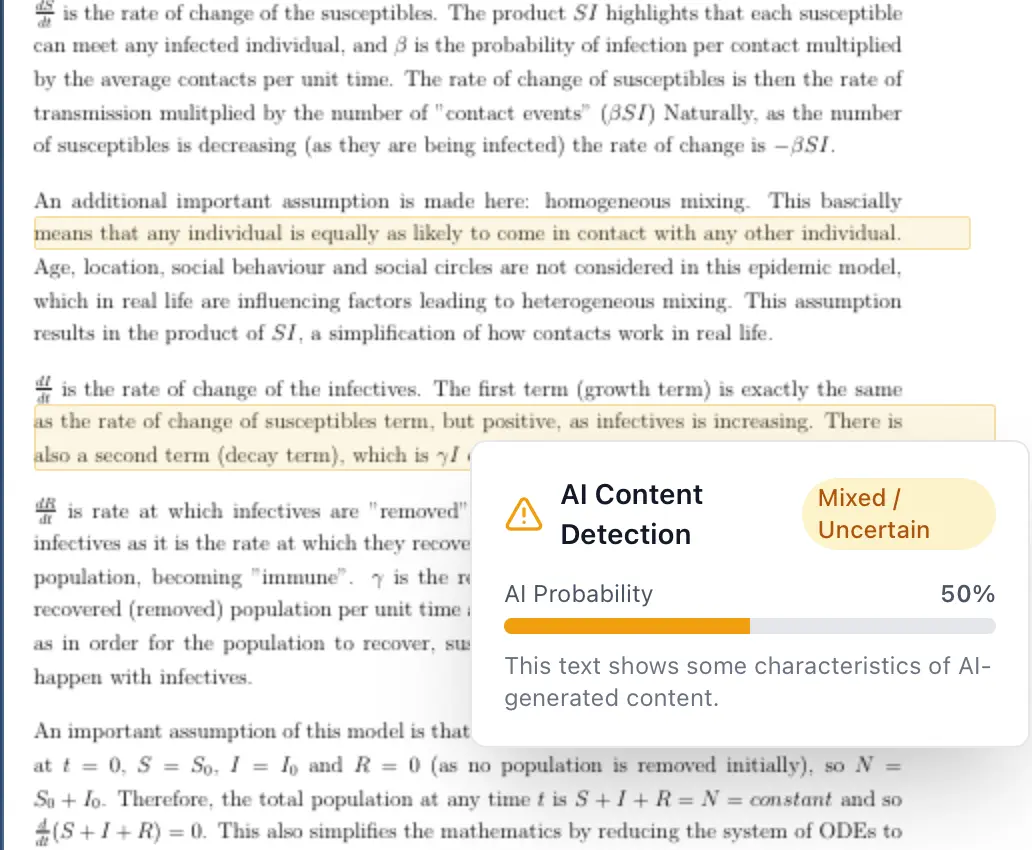The Ultimate Guide to the IB History Internal Assessment
The IB History Internal Assessment (IA) is a crucial component of your overall IB History grade, accounting for 20% of your final mark at HL and 25% at SL. This in-depth research project allows you to explore a historical topic of your choice, develop your research skills, and demonstrate your understanding of historical methodology. This ultimate guide will provide you with a step-by-step approach to crafting a high-scoring IA, covering everything from choosing a compelling research question to mastering the reflection component. We'll break down the IB criteria, offer practical tips, and even explore how AI grading assistants can help you achieve your best possible mark.
Introduction: Mastering the IB History IA
The IB History IA is more than just an essay; it's an opportunity to delve into a historical topic that genuinely interests you. It's a chance to showcase your analytical skills, your ability to evaluate sources, and your understanding of historical perspectives. This guide is designed to equip you with the knowledge and strategies you need to navigate the IA process successfully. We'll cover everything from understanding the assessment criteria to avoiding common pitfalls, ensuring you're well-prepared to tackle this significant component of your IB History course. Whether you're aiming for a 7 or simply striving to improve your understanding of historical research, this guide is your essential resource.
Struggling with IB Assessments?
Get instant, detailed feedback on your work with AI that understands IB criteria.

Understanding the IB History IA Structure
The IB History IA is a structured research paper with specific requirements. Understanding this structure is the first step to success. Here's a breakdown of the key components:
- Title Page: Include your research question, candidate name, candidate number, subject, and date.
- Table of Contents: A clear table of contents helps the examiner navigate your IA.
- Introduction: Introduce your research question, provide context, and outline your argument.
- Investigation: This is the main body of your IA, where you present your research, analyze sources, and develop your argument.
- Evaluation of Sources: Critically evaluate the value and limitations of two key sources.
- Conclusion: Summarize your findings and answer your research question.
- Reflection: Reflect on the challenges and limitations of historical research.
- Bibliography: List all sources used in your IA.
- Word Count: The IA has a word limit of 2200 words. Adhering to this limit is crucial.
Choosing a Compelling Research Question
Your research question is the foundation of your IA. A well-defined and focused question will guide your research and make your IA more manageable.
- Specificity is Key: Avoid broad questions that are difficult to answer within the word limit. For example, instead of "What were the causes of World War I?", try "To what extent was the assassination of Archduke Franz Ferdinand the primary catalyst for the outbreak of World War I?".
- Focus on Analysis: Choose a question that requires analysis and evaluation, rather than simple description.
- Personal Interest: Select a topic that genuinely interests you. This will make the research process more engaging and rewarding.
- Feasibility: Ensure that there are sufficient sources available to support your research.
Example Research Questions:
- To what extent did the policies of Perestroika and Glasnost contribute to the collapse of the Soviet Union?
- How significant was the role of women in the French Resistance during World War II?
- To what extent did the Rwandan genocide stem from pre-existing ethnic tensions, and to what extent was it a result of political manipulation?
Identifying and Evaluating Sources (Criterion A)
Criterion A focuses on your ability to select appropriate sources and analyze their value and limitations. This is a critical component of your IA.
- Relevance: Choose sources that are directly relevant to your research question.
- Variety: Use a variety of sources, including primary and secondary sources. Primary sources provide firsthand accounts, while secondary sources offer analysis and interpretation.
- Analysis of Value and Limitations: For two key sources, analyze their origin, purpose, and content to determine their value and limitations. Consider the author's bias, the intended audience, and the historical context.
Example:
Let's say you're using a diary entry from a soldier during World War I as a primary source.
- Value: The diary provides a firsthand account of the soldier's experiences, offering valuable insights into the realities of trench warfare.
- Limitations: The diary reflects the soldier's personal perspective, which may be biased or incomplete. The soldier may have omitted certain details or exaggerated others.
Achieving Top Marks (5-6): To achieve top marks in Criterion A, your research question must be clear, focused, and appropriate. Your sources must be highly relevant and well-chosen. Your analysis of the value and limitations of the two selected sources must be thorough and insightful.
Conducting a Focused Investigation (Criterion B)
Criterion B assesses your ability to conduct a focused and well-organized investigation, utilizing a variety of sources to support a clear argument.
- Organization: Structure your investigation logically, with clear paragraphs and transitions.
- Argumentation: Develop a clear and coherent argument that answers your research question.
- Use of Sources: Use your sources effectively to support your argument. Cite your sources correctly and avoid plagiarism.
- Critical Analysis: Analyze your sources critically, considering different perspectives and interpretations.
Example:
If your research question is about the causes of the Russian Revolution, you might analyze the role of economic factors, social inequality, and political instability. You would use sources to support your analysis and consider different interpretations of these factors.
Achieving Top Marks (13-15): To achieve top marks in Criterion B, your investigation must be effectively organized, clear, and coherent. You must use a variety of high-quality, reliable sources. Your argumentation must remain focused on the stated question throughout the investigation. Critical analysis must be evident through the evaluation of different perspectives and ideas presented by the sources, leading to a relevant and well-supported conclusion.
Pro Tip: Get AI-Powered Grading
Stop second-guessing your grades. Get instant feedback aligned with official IB rubrics.

Mastering the Reflection (Criterion C)
Criterion C assesses your ability to reflect on the challenges and limitations of historical research methods, drawing on your own experience.
- Connect to Your Experience: Reflect on the challenges you faced during your research, such as finding reliable sources, interpreting conflicting evidence, or dealing with bias.
- Discuss Limitations: Discuss the limitations of your research, such as the limited availability of sources or the difficulty of generalizing from a specific case study.
- Demonstrate Understanding: Demonstrate an understanding of the challenges that historians face in reconstructing the past.
Example:
You might reflect on the difficulty of accessing primary sources from a particular historical period or the challenges of interpreting sources written in a foreign language. You could also discuss the limitations of using secondary sources that may be biased or incomplete.
Achieving Top Marks (3-4): To achieve top marks in Criterion C, you must deeply reflect on the research methods employed by historians, drawing from your own experience of conducting a historical investigation. You must demonstrate a clear understanding of the challenges confronting historians and present awareness of the limitations of the research methods utilized by historians. Effectively integrate reflections into the broader context of the investigation.
Common Challenges and Mistakes to Avoid
Many students make common mistakes that can negatively impact their IA grade. Here are some challenges to be aware of:
- Unclear Research Question: A vague or overly broad research question will make your IA difficult to manage.
- Insufficient Sources: Failing to find enough relevant sources will weaken your argument.
- Lack of Analysis: Simply summarizing sources without analyzing them critically will result in a low grade.
- Poor Organization: A poorly organized IA will be difficult to follow and will detract from your argument.
- Plagiarism: Plagiarism is a serious offense and will result in a failing grade. Always cite your sources correctly.
- Ignoring the Word Count: Exceeding the word count will result in penalties.
Advanced Tips and Strategies for a Top-Scoring IA
- Start Early: Don't wait until the last minute to start your IA. Give yourself plenty of time to research, write, and revise.
- Seek Feedback: Ask your teacher or a peer to read your IA and provide feedback.
- Revise and Edit: Revise and edit your IA carefully to ensure that it is clear, concise, and error-free.
- Consult the IB History Guide: The IB History Guide contains detailed information about the IA requirements and assessment criteria.
- Read Exemplars: Reviewing examples of high-scoring IAs can provide valuable insights into what examiners are looking for.
- Focus on Depth over Breadth: It's better to explore a narrow topic in depth than to try to cover too much ground.
- Develop a Strong Thesis Statement: Your thesis statement should clearly state your argument and provide a roadmap for your IA.
Technology and Modern Assessment: The Role of AI
Technology is transforming the way we approach education, and assessment is no exception. AI-powered tools are emerging to help both students and teachers navigate the complexities of the IB program.
For students, AI can provide personalized feedback on their writing, helping them identify areas for improvement. For teachers, AI grading assistants can streamline the assessment process, saving time and ensuring consistency.
Marksy is a leading AI grading assistant specifically designed for the International Baccalaureate. It provides instant, accurate, and detailed feedback on student work based on official IB rubrics. Marksy helps teachers provide consistent, detailed feedback on IB assessments, ensuring fairness and transparency. By using official IB criteria, Marksy ensures accuracy and helps students understand exactly how to improve their work. This not only saves educators valuable time but also maintains the highest standards of assessment quality.
Conclusion: Your Path to IA Success
The IB History Internal Assessment is a challenging but rewarding task. By understanding the structure, following the assessment criteria, and avoiding common mistakes, you can significantly increase your chances of success. Remember to choose a compelling research question, conduct a thorough investigation, and reflect on the challenges of historical research. And don't forget to leverage the power of technology to enhance your learning and improve your assessment outcomes.
Next Steps:
- Choose your research question: Brainstorm potential topics and select a question that genuinely interests you.
- Gather your sources: Begin researching your topic and collecting relevant primary and secondary sources.
- Create an outline: Develop a detailed outline to guide your writing.
- Start writing: Begin writing your IA, following the structure and guidelines outlined in this guide.
- Seek feedback: Ask your teacher or a peer to read your IA and provide feedback.
- Revise and edit: Revise and edit your IA carefully to ensure that it is clear, concise, and error-free.
- Try Marksy for Free: See how Marksy can help you improve your IB scores or streamline your grading workflow. Sign up for a free trial today and experience the power of AI-powered assessment!